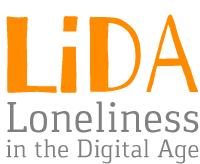LiDA project at CHI 2014
Although our project hasn’t officially started yet, Shaun Lawson and John Vines attended the ACM CHI 2014* conference in Toronto, Canada, at the end of April and took this as an opportunity to present a paper as part of the Enabling Empathy in Health and Care workshop. The paper, available here, provided an overview of the project’s aims and objectives, and explored a number of areas where technologies might alleviate experiences of episodic loneliness experienced by some populations. The paper was speculative and exploratory, and the workshop provided a good early opportunity to discuss the ways in which technology might be harnessed to support meaningful empathic relations between people.
The workshop itself was very successful, and the 30 or so people participating in it came from a diverse range of backgrounds, typically with an interest in technology being the primary overlap between them all. The first part of the day involved working in groups, where each group had read a small selection of the workshop papers and took it in turns to discuss each one. Following this, a ‘world cafe’ style activity was facilitated where new groups moved between tables and started to develop themes in relation to the papers they had read. It became clear from this activity that there were a great many interpretations and understandings of ’empathy’ in play at the workshop, while there was also a clear emergence of different ‘camps’ in understanding what the role of empathy was in the field of technology development. Some thought that all design, including technology design, was a process of being ’empathic’ with ‘the user’ and through being empathic designers will inevitably create better technologies and designs. Others saw technology instead as a mediator of empathy, in the sense that sensors, visualisations and biometrics might in one way or another offer insight into the lives of “an other” and support understanding of their point of view or experiences. There were also, inevitably, those who navigated between these poles, and saw empathy as a critical aspect of engaging with users and in the use of technology itself, but not necessarily as a quality that is easy to achieve nor a property of life that is simply engineered into designs.
While the workshop itself didn’t take the typical academic format of having a presentation followed by questions, the discursive and energetic format meant everyone got to share their views and interests in a more egalitarian way. It was clear that, from the workshop discussions, for LiDA we need to think carefully about what claims are made about how technology in, and of, itself can create empathy. Indeed, it was clear that empathy itself as a concept is slippery and easily construed to be sympathy or just mimicking or representing how others feel - challenges that also emerged during the EMoTICON sandpit from which this project was funded. However, there is clearly potential still for framing how technology can promote reflection on the lives and activity of others, or to provoke a sense of being connected and with others while being apart - and it might be that these ‘softer’ understandings of empathic design that would be best taken forward in the LiDA project.
*ACM CHI - pronounced ‘kai’ and full name the ACM SIGCHI Conference on Human Factors in Computing Systems - is the premier venue for publishing research in the field of human-computer interaction with an acceptance rate typically between 15 and 25% for its archived proceedings. The annual conference runs for six days, with the first two days dedicated to themed workshops, and the final four days to parallel sessions where authors of accepted papers present their work.










